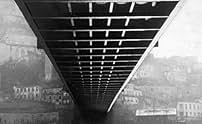A documentary that looks at the people working in the river Douro, around the city of Porto.A documentary that looks at the people working in the river Douro, around the city of Porto.A documentary that looks at the people working in the river Douro, around the city of Porto.
- Director
- Writer
7.2812
1
2
3
4
5
6
7
8
9
10
Featured reviews
The story of a working town.
Oliveira's first film, shot around the harbour in Oporto, Portugal, is an avant-garde series of images of the fishermen and assorted workers of the town. Although there are obvious influences from other 'art' films of the time, it isn't simply a montage of unrelated images, but a vision of a working town, even with so much as a narrative thread running through. The version I have seen (at the London Film Festival 2001) was overseen by the director himself with a new score by Emmanuel Nunes. It is a pounding, vibrant 18 minutes, despite it's limitations.
An honest first effort by Manoel de Oliveira
I believe this is something of an experimental short film/documentary by the director Manoel de Oliveira, but for a first effort the result is satisfying. It basically isn't much more than a portrait of labor and industry around Douro River in the city of Porto, but it stands alone for its innovative filming techniques which attempt to capture as many images and areas of the city as possible - something that could be described as cinematographic liberty.
On paper, the idea of this 'Douro, Faina Fluvial' is simple and even minimalist. Still, it offers things which many so-called more "complete" movies don't, starting with the cinematographic liberty I mentioned.
On paper, the idea of this 'Douro, Faina Fluvial' is simple and even minimalist. Still, it offers things which many so-called more "complete" movies don't, starting with the cinematographic liberty I mentioned.
Beautiful document
Manoel de Oliveira's first film is a briskly cut summary of a day in the working lives of riverside folk on the banks of the Douro River.
It's an early signpost to later technique, notably his capturing and framing of aesthetically pleasing shots. This is one of the appeals of 'Douro' - it's ravishing to look at - but it's also a valuable document of working practices, and it shows (a little self-consciously, it must be said) the arrival of the technology that would change the face of the river banks around the Ponte de D. Luís, in Porto.
One false and unnecessary note is the introduction of a little fictional vignette of a story - a worker is 'trampled' by oxen, to the great dismay of his sweetheart. But this doesn't take much away from a never-less-than-interesting little film.
It's an early signpost to later technique, notably his capturing and framing of aesthetically pleasing shots. This is one of the appeals of 'Douro' - it's ravishing to look at - but it's also a valuable document of working practices, and it shows (a little self-consciously, it must be said) the arrival of the technology that would change the face of the river banks around the Ponte de D. Luís, in Porto.
One false and unnecessary note is the introduction of a little fictional vignette of a story - a worker is 'trampled' by oxen, to the great dismay of his sweetheart. But this doesn't take much away from a never-less-than-interesting little film.
Did you know
- TriviaShown before Antonio Lopes Ribeiro's "Gado Bravo' (1934).
- ConnectionsEdited into Porto of My Childhood (2001)
Details
- Release date
- Country of origin
- Language
- Also known as
- Working on the Douro River
- Filming locations
- Farol, Foz do Douro, Portugal(Lighthouse)
- See more company credits at IMDbPro
- Runtime
- 20m
- Color
- Sound mix
- Aspect ratio
- 1.37 : 1
Contribute to this page
Suggest an edit or add missing content

















